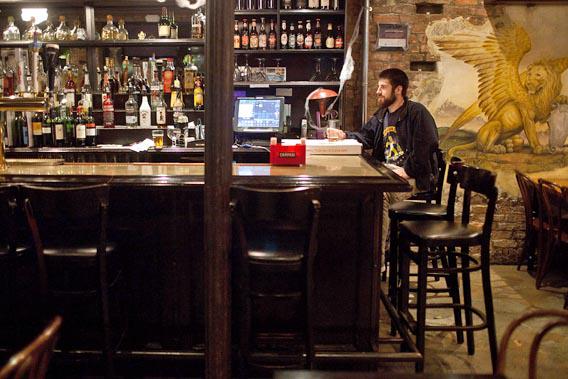An interesting thing happened in my neighborhood recently. A small posse of local busybodies organized as the Shaw Dupont Citizens Alliance proposed a moratorium on new liquor licenses for the increasingly vibrant nightlife corridors on 14th Street and U Street in Washington, D.C. Similar moratoria already constrain longer-established D.C. drinking hubs, and when I heard about the Shaw Dupont proposal, initially I felt despondent. But, in fact, the NIMBYs look set to lose. A guy named Michael Hamilton founded a counter-group called In My Backyard—D.C. to argue for growth-friendly policies. At a neighborhood listening session, moratorium proponents were vastly outnumbered. For now it looks as if Logan Circle and U Street will continue to be safe for entrepreneurs who want to turn vacant storefronts and derelict structures into bars and restaurants.
Similar fights play out in cities all around the country but not always with the same happy outcome. Almost invariably, these fights give the extreme deference to the concerns of immediate neighbors. But this deference has a cost for everyone else. Cities need to recognize that bars and restaurants are not the ugly stepchildren of the modern urban economy: They are its greatest strength. They spur small-business growth and creation citywide. When cities consider whether to allow them, they should think about the overall benefits to the region, not the particular complaints of near neighbors.
My neighborhood is hardly the only nightlife cluster in urban America featuring a version of this controversy. Last fall a group of residents of the Lower East Side in New York—some oddly appropriating the “Occupy” brand—tried to bring a halt to the issuance of new liquor licenses. Chicago has areas that have voted to become completely “dry” and moratorium zones where existing businesses stay open but no new liquor licenses can be issued. In California, many whole counties—including all of San Francisco—have gone into moratorium status.
Proponents of curtailing licenses typically cite local nuisance effects as the key reason. One of the Lower East Side anti-booze crusaders was quoted as worrying about a “Wild West atmosphere.” In Washington, agitators cite the nightmare of becoming “the next Adams-Morgan”—while the actual Adams-Morgan is itself one of the areas operating under a moratorium.
These complaints ought to be understood in the larger context of urban economics. Moratorium boosters often seem to think there’s something unnatural about the heavy concentration of booze-serving establishments in a single area. They also think restricting bars and restaurants will cause the kind of thriving local retail they remember from old Jane Jacobs books to magically appear.
In reality, there’s nothing particularly unusual about similar firms clustering together. Auto companies were all near Detroit for a long time; high-tech firms huddle in the Bay Area; And nightlife hubs arise for similar reasons. Drinking and dining establishments want to be where people are likely to look for them. And people want to go to places where they’ll find options. Complicated interdependencies and complementarities can arise. The late-night pizza joint’s proximity to the dive bar increases the value of both. Alternatively, you might want to meet friends for dinner in a neighborhood where you’re also likely to be able to grab a drink afterwards. Theaters and live-music venues benefit from proximity to other after-hours activities and also drive customers to bars and restaurants. Forcing the cluster to disperse destroys its value. Preventing new firms from entering the cluster fosters high prices and mediocrity, as underperforming bars and restaurants can essentially free-ride on the rest of the cluster.
Providing these kinds of dense networks of related but independent small undertakings is exactly what cities are good at.
What they’re not so good at is playing host to modern retailers. Traditional urban neighborhoods feature old buildings with small, often irregularly shaped spaces that are ill-suited to the needs of contemporary retail chains. Refusing to grant liquor licenses won’t undo the decades of history that brought us big-box stores.* It just leads to empty storefronts and car rides out to Ikea or Costco. The good news for cities is that lately Amazon has been crushing the big-box sector, and e-commerce levels the shopping playing field between traditional urban neighborhoods and suburban ones. And those smallish and idiosyncratic structures are ideal spaces for bars and restaurants—much better than personality-free malls. Even better is that the Internet isn’t going to put restaurants out of business, for obvious reasons.
Under the circumstances, promoting the development and expansion of nightlife hubs should be a key economic development priority for cities. Or, rather, preventing neighborhood busybodies from stifling them ought to be. That means making decisions about liquor-licensing rules at a higher level, with consideration of the full citywide effects in terms of tax revenue and job creation. And it means attempting to directly address perceived problems with crime and trash. Instead of refusing to issue new liquor licenses, why not send more cops and offer more frequent street cleaning in the hubs? Food service isn’t the sexiest sector in the economy. But it’s one that every city can be strong in. It also provides great opportunities for locally owned businesses, and meaningful opportunities for people with limited formal education to work their way up the ladder and go into business for themselves. Cities need to treat it as a more serious matter than a simple question of neighborhood opinion.
Correction, March 27, 2013: A sentence in this article originally was misphrased in a way that reversed its meaning; it read, “Refusing to grant liquor licenses undoes the decades of history that brought us big-box stores.” (Return to the corrected sentence.)
